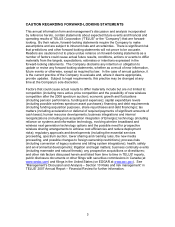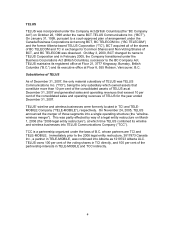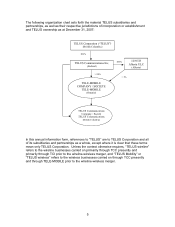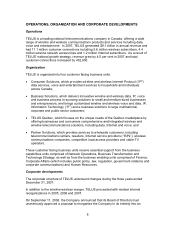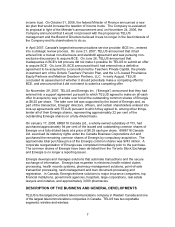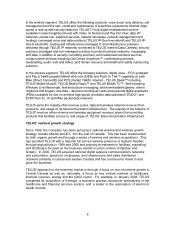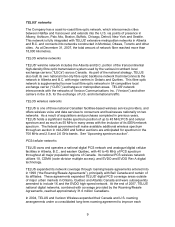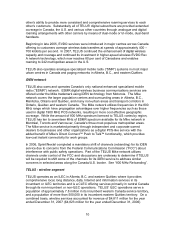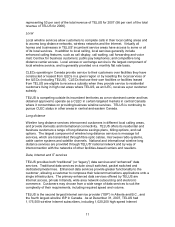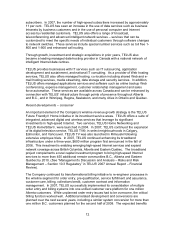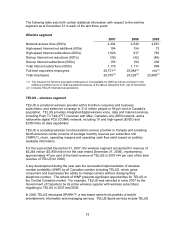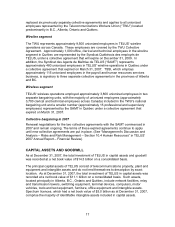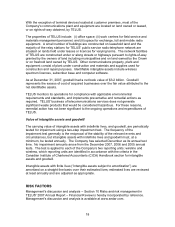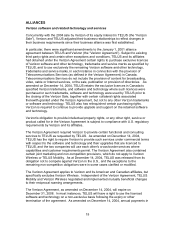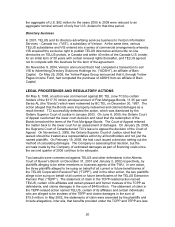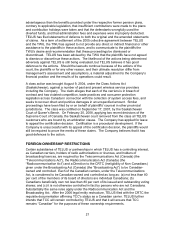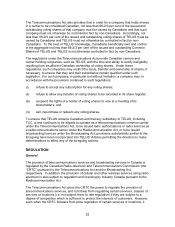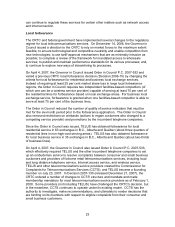Telus 2007 Annual Report Download - page 13
Download and view the complete annual report
Please find page 13 of the 2007 Telus annual report below. You can navigate through the pages in the report by either clicking on the pages listed below, or by using the keyword search tool below to find specific information within the annual report. 13
of this project include streamlined and standardized processes and the elimination over
time of multiple legacy information systems.
In 2007, the CRTC granted residential local exchange forbearance in markets where
incumbents are facing increasing competitive pressure. TELUS received approval for
deregulation of wireline residential phone service in 63 communities (about 75 per cent
of residential lines in non-high cost serving areas) across B.C., Alberta and Québec.
This is expected to positively impact TELUS’ competitiveness by providing improved
pricing, marketing and bundling flexibility.
Recent developments – business
In 2005, TELUS successfully completed a migration of 99 per cent of its long distance
traffic from the old Stentor platform. This fibre-optic network provides TELUS with
certain competitive advantages in the business marketplace.
For business customers, TELUS provides a full suite of IP-based advanced application
services and the ability to integrate voice mail, e-mail, data and video through a user-
friendly online Web portal. TELUS is exploiting the competitive advantage it has in
managed data and IP solutions, utilizing its IP network to secure recurring data revenues
in Ontario and Québec.
TELUS has offered its IP-One product family to businesses in many cities in Ontario
and Québec since 2004. In 2005, the Company expanded its suite of advanced IP-
based network applications with the introduction of IP-One Evolution. This service
enables business customers to migrate from their existing Centrex systems to IP
telephony at a pace that best suits their needs.
In the small business market, TELUS is pursuing growth with TELUS Business One®, a
portfolio of solutions tailored to the needs of small business customers. In 2007, TELUS
expanded the solutions available, which now include connectivity, security and a range
of powerful IP-based tools customized for smaller clients.
TELUS delivers human resources and end-to-end solutions to healthcare and other
organizations.
In 2005, TELUS Sourcing Solutions Inc. (“TSSI”), an indirect subsidiary of TELUS, entered
into a 10-year contract with the Calgary Board of Education, in which 50 Calgary Board
employees were transferred to TSSI. This contract provides for the delivery of some of the
district’s human resources services. TSSI also signed a 15-year agreement with Hamilton
Health Sciences to deliver the process and information technology components of its human
resources services.
The acquisition of Emergis in January 2008 combines Emergis’ capabilities with TELUS’
customer base, strong brand, and financial resources, and should position TELUS to lead
the development of solutions in electronic health claims, electronic health records, pharmacy
management systems, consulting, security and financial business process outsourcing in
Canada.
A number of large national contracts for managed data solutions were signed in 2005,
including an eight-year agreement with Intrawest Corporation to be the exclusive


